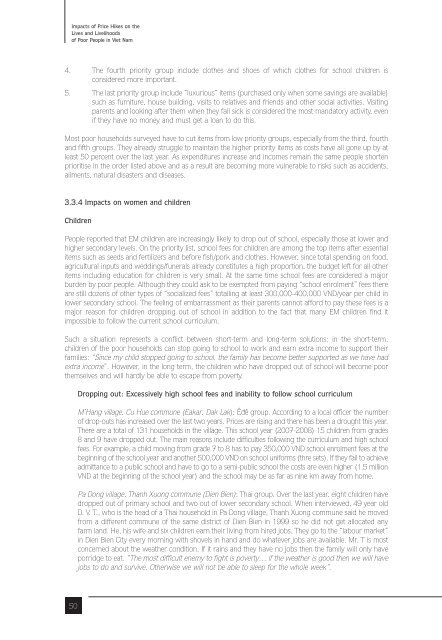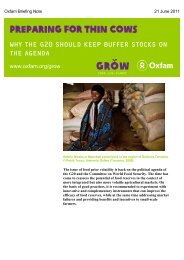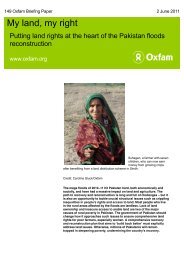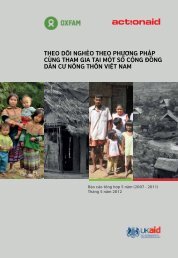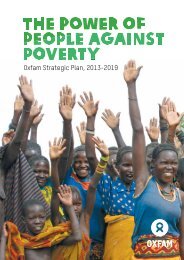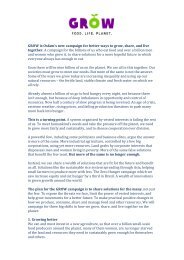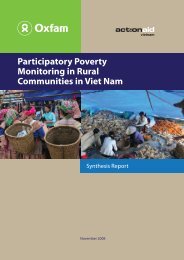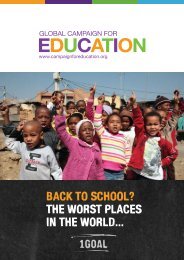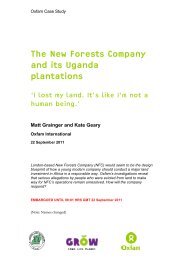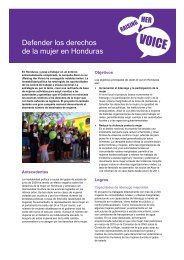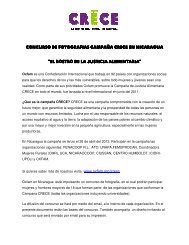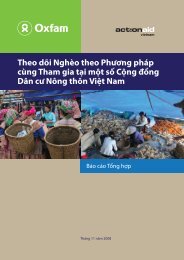Untitled - Oxfam Blogs
Untitled - Oxfam Blogs
Untitled - Oxfam Blogs
You also want an ePaper? Increase the reach of your titles
YUMPU automatically turns print PDFs into web optimized ePapers that Google loves.
Impacts of Price Hikes on the<br />
Lives and Livelihoods<br />
of Poor People in Viet Nam<br />
4. The fourth priority group include clothes and shoes of which clothes for school children is<br />
considered more important.<br />
5. The last priority group include “luxurious” items (purchased only when some savings are available)<br />
such as furniture, house building, visits to relatives and friends and other social activities. Visiting<br />
parents and looking after them when they fall sick is considered the most mandatory activity, even<br />
if they have no money and must get a loan to do this.<br />
Most poor households surveyed have to cut items from low priority groups, especially from the third, fourth<br />
and fifth groups. They already struggle to maintain the higher priority items as costs have all gone up by at<br />
least 50 percent over the last year. As expenditures increase and incomes remain the same people shorten<br />
prioritise in the order listed above and as a result are becoming more vulnerable to risks such as accidents,<br />
ailments, natural disasters and diseases.<br />
3.3.4 Impacts on women and children<br />
Children<br />
People reported that EM children are increasingly likely to drop out of school, especially those at lower and<br />
higher secondary levels. On the priority list, school fees for children are among the top items after essential<br />
items such as seeds and fertilizers and before fish/pork and clothes. However, since total spending on food,<br />
agricultural inputs and weddings/funerals already constitutes a high proportion, the budget left for all other<br />
items including education for children is very small. At the same time school fees are considered a major<br />
burden by poor people. Although they could ask to be exempted from paying “school enrolment” fees there<br />
are still dozens of other types of “socialized fees” totalling at least 300,000-400,000 VND/year per child in<br />
lower secondary school. The feeling of embarrassment as their parents cannot afford to pay these fees is a<br />
major reason for children dropping out of school in addition to the fact that many EM children find it<br />
impossible to follow the current school curriculum.<br />
Such a situation represents a conflict between short-term and long-term solutions: in the short-term,<br />
children of the poor households can stop going to school to work and earn extra income to support their<br />
families: “Since my child stopped going to school, the family has become better supported as we have had<br />
extra income”. However, in the long term, the children who have dropped out of school will become poor<br />
themselves and will hardly be able to escape from poverty.<br />
Dropping out: Excessively high school fees and inability to follow school curriculum<br />
M’Hang village, Cu Hue commune (Eakar, Dak Lak): Êđê group. According to a local officer the number<br />
of drop-outs has increased over the last two years. Prices are rising and there has been a drought this year.<br />
There are a total of 131 households in the village. This school year (2007-2008) 15 children from grades<br />
8 and 9 have dropped out. The main reasons include difficulties following the curriculum and high school<br />
fees. For example, a child moving from grade 7 to 8 has to pay 350,000 VND school enrolment fees at the<br />
beginning of the school year and another 500,000 VND on school uniforms (thre sets). If they fail to achieve<br />
admittance to a public school and have to go to a semi-public school the costs are even higher (1.5 million<br />
VND at the beginning of the school year) and the school may be as far as nine km away from home.<br />
Pa Dong village, Thanh Xuong commune (Dien Bien): Thai group. Over the last year, eight children have<br />
dropped out of primary school and two out of lower secondary school. When interviewed, 49 year old<br />
D. V. T., who is the head of a Thai household in Pa Dong village, Thanh Xuong commune said he moved<br />
from a different commune of the same district of Dien Bien in 1999 so he did not get allocated any<br />
farm land. He, his wife and six children earn their living from hired jobs. They go to the “labour market”<br />
in Dien Bien City every morning with shovels in hand and do whatever jobs are available. Mr. T is most<br />
concerned about the weather condition. If it rains and they have no jobs then the family will only have<br />
porridge to eat. “The most difficult enemy to fight is poverty… if the weather is good then we will have<br />
jobs to do and survive. Otherwise we will not be able to sleep for the whole week”.<br />
50


